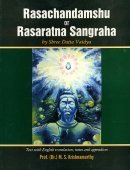Ashtavidha, Aṣṭavidha, Ashtan-vidha: 10 definitions
Introduction:
Ashtavidha means something in Hinduism, Sanskrit. If you want to know the exact meaning, history, etymology or English translation of this term then check out the descriptions on this page. Add your comment or reference to a book if you want to contribute to this summary article.
The Sanskrit term Aṣṭavidha can be transliterated into English as Astavidha or Ashtavidha, using the IAST transliteration scheme (?).
In Hinduism
Shaktism (Shakta philosophy)
Source: Google Books: ManthanabhairavatantramAṣṭavidha (अष्टविध) refers to the “eight kinds (of Kula)”, according to the Manthānabhairavatantra, a vast sprawling work that belongs to a corpus of Tantric texts concerned with the worship of the goddess Kubjikā.—Accordingly, “1) Without plane (of existence), established in Rudra's energy, that is Kula in the Kula teachings. 2) Kula is said to be the body. 3) Kula is said to be the end of meditation. 4) Kula is the aggregate of the (Eight Mothers who are the) Octad of Kula. 5) The Lotus (i.e. Yoni) of Kula (at the End of the Twelve above the deity's head) faces downwards. 6) One should know that Kula is Śakti. 7) It is said here that Kula is knowledge. 8) Kula is the instrument (of emanation and attainment). Kula is of eight kinds (aṣṭavidha—kulam aṣṭavidhaṃ kule) in the Kula (teaching). He who knows the omnipresent Kula is a teacher in the Kula. He who says that Kulakaula is devoid of the knowledge of the planes (of existence) does not have liberation and he wanders in the world of transmigration full of the wombs (within which he is reborn)”.

Shakta (शाक्त, śākta) or Shaktism (śāktism) represents a tradition of Hinduism where the Goddess (Devi) is revered and worshipped. Shakta literature includes a range of scriptures, including various Agamas and Tantras, although its roots may be traced back to the Vedas.
Ayurveda (science of life)
Toxicology (Study and Treatment of poison)
Source: Shodhganga: Kasyapa Samhita—Text on Visha ChikitsaAṣṭavidha (अष्टविध) refers to the “eight-fold” (causes of snake-bites), as taught in the Kāśyapa Saṃhitā: an ancient Sanskrit text from the Pāñcarātra tradition dealing with both Tantra and Viṣacikitsā—an important topic from Āyurveda which deals with the study of Toxicology (Agadatantra or Sarpavidyā).—The Kāśyapasaṃhitā cites eight (aṣṭavidha) reasons that cause snake-bites which are—fear, intoxication, hunger, attack, pride, lack of dwelling, previous enmity and fate.

Āyurveda (आयुर्वेद, ayurveda) is a branch of Indian science dealing with medicine, herbalism, taxology, anatomy, surgery, alchemy and related topics. Traditional practice of Āyurveda in ancient India dates back to at least the first millenium BC. Literature is commonly written in Sanskrit using various poetic metres.
Languages of India and abroad
Sanskrit dictionary
Source: DDSA: The practical Sanskrit-English dictionaryAṣṭavidha (अष्टविध).—a. [aṣṭāvidhāḥ prakārāḥ asya] eight-fold, of eight kinds.
Aṣṭavidha is a Sanskrit compound consisting of the terms aṣṭan and vidha (विध).
Source: Cologne Digital Sanskrit Dictionaries: Shabda-Sagara Sanskrit-English DictionaryAṣṭavidha (अष्टविध).—mfn.
(-dhaḥ-dhā-dhaṃ) Eightfold, of eight kinds. E. aṣṭa eight, and vidha sort.
Source: Cologne Digital Sanskrit Dictionaries: Benfey Sanskrit-English DictionaryAṣṭavidhā (अष्टविधा).—adj. eight-fold, [Mānavadharmaśāstra] 7, 154.
Aṣṭavidhā is a Sanskrit compound consisting of the terms aṣṭan and vidhā (विधा).
Source: Cologne Digital Sanskrit Dictionaries: Cappeller Sanskrit-English DictionaryAṣṭavidha (अष्टविध).—[adjective] eightfold, of eight kinds.
Source: Cologne Digital Sanskrit Dictionaries: Monier-Williams Sanskrit-English DictionaryAṣṭavidha (अष्टविध):—[=aṣṭa-vidha] [from aṣṭa > aṣṭan] mfn. eightfold, of eight kinds, [Manu-smṛti vii, 154, etc.]
Source: Cologne Digital Sanskrit Dictionaries: Yates Sanskrit-English DictionaryAṣṭavidha (अष्टविध):—[aṣṭa-vidha] (dhaḥ-dhā-dhaṃ) a. Eightfold.
[Sanskrit to German]
Sanskrit, also spelled संस्कृतम् (saṃskṛtam), is an ancient language of India commonly seen as the grandmother of the Indo-European language family (even English!). Closely allied with Prakrit and Pali, Sanskrit is more exhaustive in both grammar and terms and has the most extensive collection of literature in the world, greatly surpassing its sister-languages Greek and Latin.
See also (Relevant definitions)
Partial matches: Ashta, Vidha.
Starts with: Ashtavidhakushtha, Ashtavidhanayika, Ashtavidhaprakrityavastha, Ashtavidhapratima, Ashtavidhaputagaranayaka, Ashtavidhasamadhi.
Full-text: Ashta-vidha-arcana, Ashta-vidha-bhakti-kriya, Ashtanga-bhakti-krama, Ashta, Ashtasarga, Tamra, Ashtakula, Vidha.
Relevant text
Search found 5 books and stories containing Ashtavidha, Aṣṭavidha, Ashtan-vidha, Aṣṭan-vidha, Astan-vidha, Astavidha, Aṣṭavidhā, Aṣṭan-vidhā, Ashta-vidha, Aṣṭa-vidha, Asta-vidha; (plurals include: Ashtavidhas, Aṣṭavidhas, vidhas, Astavidhas, Aṣṭavidhās, vidhās). You can also click to the full overview containing English textual excerpts. Below are direct links for the most relevant articles:
Manusmriti with the Commentary of Medhatithi (by Ganganatha Jha)
Verse 7.154 < [Section XII - Daily Routine of Work]
Sushruta Samhita, volume 1: Sutrasthana (by Kaviraj Kunja Lal Bhishagratna)
A History of Indian Philosophy Volume 2 (by Surendranath Dasgupta)
Part 11 - The Theory of Rasas and their Chemistry < [Chapter XIII - Speculations in the Medical Schools]
The Padma Purana (by N.A. Deshpande)
Chapter 132 - Remembering Viṣṇu < [Section 6 - Uttara-Khaṇḍa (Concluding Section)]
The Linga Purana (by J. L. Shastri)
Chapter 72 - Construction of Rudra’s chariot < [Section 1 - Uttarabhāga]
Related products
